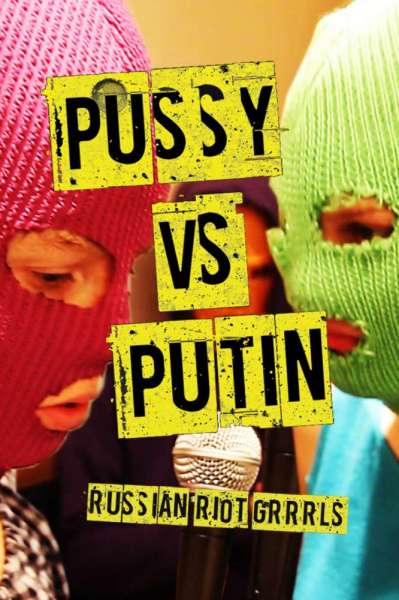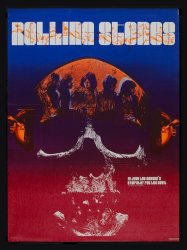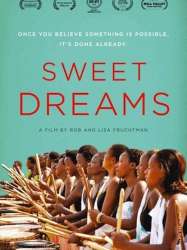Pussy Versus Putin is a film of genre Documentary
Pussy Versus Putin (2013)

If you like this film, let us know!
- Infos
- Casting
- Technical infos
- Photos
- Videos
- Film quotes
- Characters
- Music
- Awards
Themes Feminist films, Films about music and musicians, Documentary films about music and musicians, Documentary films about politics, Political films
Rating59%










Pussy versus Putin is a 2013 Russian documentary film by the film collective Gogol's Wives chronicling the history of the group Pussy Riot and their struggle with the political regime in Russia. The film received the NTR IDFA Award for Best Mid-Length Documentary at the 2013 International Documentary Film Festival Amsterdam.
The one-hour film includes sequences in which group members discuss their political aims, footage of their guerrilla-style performances during the run-up to the 2012 Russian presidential election as well as the intimidation and physical harassment they face, shot from behind bars and inside prison vans.
Scenes
2011 (Moscow) — Pussy Riot performance on the trolleybus roof in Moscow
2011 (Moscow Metro) — Nadezhda Tolokonnikova is taken into police custody
Comments
Leave comment :
Suggestions of similar film to Pussy Versus Putin
There are 14639 with the same cinematographic genres (including 702 with exactly the same 2 genres than Pussy Versus Putin), 12473 films with the same themes (including 1 films with the same 5 themes than Pussy Versus Putin), to have finally 70 suggestions of similar films.If you liked Pussy Versus Putin, you will probably like those similar films :

Pussy Riot: A Punk Prayer (2013)
, 1h28Origin Russie
Genres Documentary, Musical
Themes Feminist films, Films about music and musicians, Politique, Documentary films about music and musicians, Documentaire sur une personnalité, Musical films, Political films
Actors Madonna, Yoko Ono
Rating69%






The U.S. vs. John Lennon (2006)
, 1h39Origin USA
Genres Documentary, Musical
Themes Films about music and musicians, Documentary films about historical events, Documentary films about music and musicians, Documentaire sur une personnalité, Documentary films about politics, Musical films, Political films
Actors Tariq Ali, Walter Cronkite, John Lennon, Yoko Ono, David Peel, Gore Vidal
Rating72%





Alors que la guerre du Viêtnam suscite de plus en plus la polémique, que les manifestations s'intensifient et que le gouvernement américain multiplie les opérations d'espionnage et d'écoute, un chanteur célèbre décide de militer pour la paix. Il doit alors faire face aux représailles du gouvernement américain.

Girls Rock! (2008)
, 1h30Origin USA
Genres Documentary, Musical
Themes Films about children, Feminist films, Films about music and musicians, Documentary films about music and musicians, Documentaire sur une personnalité, Musical films, Political films
Rating67%





 , 1h33
, 1h33Directed by Barbara Kopple, Cecilia Peck
Origin USA
Genres Documentary, Musical
Themes Films about music and musicians, Documentary films about historical events, Documentary films about music and musicians, Documentaire sur une personnalité, Documentary films about politics, Musical films, Political films
Actors Elizabeth Reaser, Emily Robison, Adrian Pasdar, Rick Rubin
Rating75%





The film opens during the Dixie Chicks' 2003 Top of the World Tour, discussing the Dixie Chicks' super-star status prior the incident at their London show. They had sold more albums in the United States than any other female band in history. With the release of their 2002 album Home, they were again at the top of the Billboard Charts. The new single from that album "Travelin' Soldier", a sensitive depiction of a soldier's life during the Vietnam War era, and the young woman who waited for him, finding he was killed in battle, had peaked at #1 on the US Billboard Hot Country Songs Chart.

Sympathy for the Devil (1968)
, 1h50Directed by Jean-Luc Godard
Genres Documentary, Musical
Themes Films about anarchism, Films about music and musicians, Politique, Documentary films about music and musicians, Documentary films about politics, Documentary films about anarchism, Musical films, Political films
Actors Mick Jagger, Marianne Faithfull, Anne Wiazemsky, Iain Quarrier, Jean-Luc Godard, James Fox
Rating62%





Composing the film's main narrative thread are several long, uninterrupted shots of The Rolling Stones in a sound studio, recording and rerecording various parts to "Sympathy for the Devil." The dissolution of Stone Brian Jones is vividly portrayed, and the chaos of 1968 is made clear when a line referring to the killing of John F. Kennedy is heard changed to the plural after the assassination of Robert F. Kennedy in June.

Sweet Dreams (2012)
, 1h26Directed by Lisa Fruchtman
Origin USA
Genres Drama, Documentary, Historical, Musical
Themes Films set in Africa, Films about music and musicians, Films about racism, Documentary films about racism, Documentary films about law, Documentary films about war, Documentary films about historical events, Documentary films about music and musicians, Documentaire sur une personnalité, Documentary films about politics, Musical films, Political films
Rating76%






The Love We Make (2011)
, 1h31Origin USA
Genres Documentary, Musical
Themes Films based on the September 11 attacks, Films about music and musicians, Films about religion, Films about terrorism, Transport films, Aviation films, Documentary films about law, Documentary films about war, Documentary films about historical events, Documentary films about music and musicians, Documentary films about politics, Documentary films about religion, Documentary films about technology, Documentary films about terrorism, Documentary films about cities, Musical films, Political films, Films about Islam, Disaster films, Films about aviation accidents or incidents, Films about hijackings
Actors Paul McCartney, David Bowie, Jim Carrey, Harvey Weinstein, Leonardo DiCaprio, Jimmy Fallon
Rating64%





 , 1h31
, 1h31Origin Bresil
Genres Drama, Biography, Documentary, Musical
Themes Films about music and musicians, Documentary films about war, Documentary films about historical events, Documentary films about music and musicians, Documentaire sur une personnalité, Political films, Documentary films about World War II
Actors Alice Faye, Aurora Miranda, Carmen Miranda, Aloísio de Oliveira, Rita Moreno, Cesar Romero
Rating75%





Carmen Miranda, an almost ghostly character in the imaginary of Portuguese, Brazilian, and American audiences, comes back to life in the first scene of the documentary as a dream narrated by Helena Solberg. Images from her memorial service in Rio de Janeiro follow, showing the grief of her Brazilian fans as she says goodbye to what she considered her homeland. Born in the small Portuguese village of Varzea da Ovelha e Aliviada on February 9, 1909, Carmen was appropriated by the people of her village as a symbol of success. Making use of interviews with her younger sister Aurora Miranda, the documentary tales the migration story of Carmen, from Portugal to Brazil, were they arrived in November 1909. Carmen Miranda, daughter of a modest barber, Jose Maria Pinto da Cunha, lived in Rio de Janeiro. There, while working at a hat store, she was first discovered as a singing talent, growing up in Rio de Janeiro, as a working class adolescent, she noticed the strong influence of Samba music as a powerful cultural aspect of life in Rio’s slums.

Heavy Metal in Baghdad (2007)
, 1h24Genres Documentary, Musical
Themes Films about music and musicians, Documentary films about war, Documentary films about historical events, Documentary films about music and musicians, Documentaire sur une personnalité, Musical films, Political films
Rating75%





In 2003, the Iraqi heavy-metal band Acrassicauda was the subject of a Vice magazine article. With the magazine's help, they were able to stage a sell-out show in 2005 despite the recent ousting of Saddam Hussein. Filmmakers from Vice returned to Iraq in 2006 to track down the band. Upon their return they discovered the multitude of death and destruction, including rehearsing studios destroyed by bombs.

Downloaded (2013)
, 1h46Directed by Alex Winter
Genres Documentary, Musical
Themes Films about computing, Films about music and musicians, Documentary films about business, Documentary films about music and musicians, Documentary films about technology, Political films
Actors Jon Stewart, Henry Rollins, Billy Corgan
Rating67%





This documentary film addresses the evolution of digital media sharing on the Internet. It features exclusive interviews with software developers and musicians about controversial filesharing software, and particularly Napster. It follows Napster from its rise in 1998, through the swarm of lawsuits that ensued and to its acquisition by Rhapsody in 2011. Some of those interviewed include Henry Rollins, Billy Corgan, former record producer and Island Records founder Chris Blackwell, former Sony Music Chairman Don Ienner, former CEO of the RIAA Hilary Rosen, Beastie Boys’ Mike D, Nine Inch Nails frontman Trent Reznor and Noel Gallagher.
 Connection
Connection